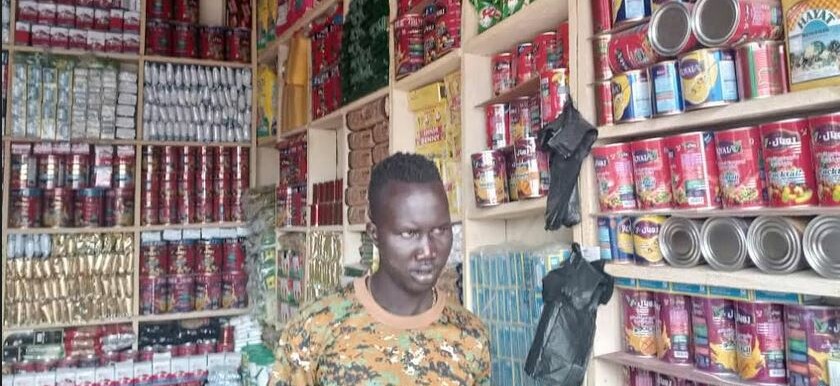A local trader in the Lakes State capital Rumbek has advised cattle owners to sell some of their stock and engage in business to stop foreign entrepreneurs from dominating trade and repatriating huge sums of money.
Joseph Jiedo, 30, who plies his trade in the main market in Rumbek town told Radio Tamazuj Wednesday that he started his thriving business by selling clothes after he got SSP 50,000 from his sister to buy a bale of clothes.
“At the time, I bought clothes using SSP 45,000 and brought them to Rumbek where I sold them in the open in the market until they sold out. I went back to Juba and bought three more bales of clothes and returned to Rumbek with them and sold them and my business started growing,” he narrated. “However, I had a setback when I sent money to Juba for more clothes during the rainy season. When the clothes arrived, they had been spoiled by water on the way and I got disorganized.”
Jiedo said he was forced to change tactics after his loss and started selling items on a small table.
“I used to buy different items like biscuits, sweets, cigarettes, tea leaves, soap, and sugar from wholesalers in the market and resell them from my small table. I then got a small kiosk in the market and had a piggybank where I would save SSP 1,000 every day for two months,” he said. “When I opened this small box of money after two months I found enough money and I went back to Juba and bought assorted goods and fully stocked my kiosk. At his time, I was still operating at a small scale.”
The enterprising trader then diversified into agricultural produce and would buy groundnuts during the harvesting.
“I would go and buy enough bags of groundnuts and sell them quickly in the market and this made my business grow gradually,” he revealed. “I now have purchasing power and can buy goods in large quantities. I now purchase cigarettes, biscuits, sweets, power milk, Azam, and other goods in cartons. My business is growing into a small wholesale shop in Rumbek market and I am doing well.”
On the flip side, Jiedo however said there are some imported goods he can only buy from Ethiopian wholesalers near the market and that the profit margins on such items are small.
“We do not have the purchasing power to go to Kampala and buy goods because our businesses are still growing so we buy from the Ethiopian wholesalers,” he explained. “We then sell the items in the market at retail prices. We do this because we still cannot buy goods from outside the country and transport them.”
According to the merchant, commerce requires patience. He advised individuals who own cattle to sell some of them to get capital to startup businesses.
“We South Sudanese people do not need foreigners to dominate everything because we have brains like them. We have people who own about 30 cows or even more in the cattle camps and they are just loitering here in the market,” he advised. “If one sells those cows, he can build a big shop and run his own business. There are even those who have a lot of cattle and own shops in the market that they lease to foreigners. They should instead sell some cattle and establish businesses.”
Jiedo castigated people who wait for government salaries and yet they can sell cows, get capital, and start a business.
“We have to use our brains and work. Even if you work for the government, do your small business so that you can survive even if salaries are delayed. The problem with South Sudanese is that they do not work together and cooperate unlike the Darfuri, Ethiopian, Somali, Arab, and other traders who support each other and speak with one voice,” Jiedo observed. “If we can adopt this style, South Sudanese will grow in business and develop our nation. Our people work alone and do not share trade tips or even advice and this has led to the business of many people collapsing. This is what is killing our businesses.”
“Others resort to marrying young girls and run broke and their business fails,” the merchant concluded.




